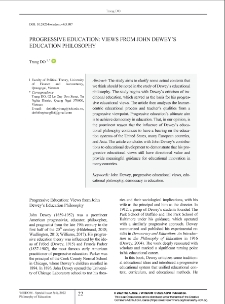Object
Title: Progressive Education: Views from John Dewey’s Education Philosophy
Journal or Publication Title:
Date of publication:
Volume:
Number:
ISSN:
Corporate Creators:
Խ․ Աբովյանի անվան հայկական պետական մանկավարժական համալսարան
Coverage:
Abstract:
The study aims to clarify some actual contents that we think should be noted in the study of Dewey‟s educational philosophy. The study begins with Dewey‟s criticism of traditional education, which served as the basis for his progressive educational views. The article then analyzes the learner-centric educational process and teacher‟s qualities from a progressive viewpoint. Progressive education‟s ultimate aim is to achieve democracy in education. That, in our opinion, is the prominent reason that the influence of Dewey‟s educational philosophy continues to have a bearing on the education systems of the United States, many European countries, and Asia. The article concludes with John Dewey‟s contributions to educational development to demonstrate that his progressive educational views still have directional value and provide meaningful guidance for educational innovation in many countries.
Place of publishing:
Երևան
Publisher:
Format:
Identifier:
oai:arar.sci.am:372192
Language:
Object collections:
Last modified:
Oct 8, 2025
In our library since:
Apr 3, 2024
Number of object content hits:
71
All available object's versions:
https://arar.sci.am/publication/402130
Show description in RDF format:
Show description in OAI-PMH format:
-
Իմաստություն=Wisdom=Мудрость
-
Իմաստություն, 2013, N 1
-
Իմաստություն, 2014, N 1 (2)
-
Իմաստություն, 2014, N 2 (3)
-
Իմաստություն, 2015, N 1 (4)
-
Wisdom, 2015, N 2 (5)
-
Wisdom, 2016, N 1 (6)
-
Wisdom, 2016, N 2 (7)
-
Wisdom, 2017, N 1 (8)
-
Wisdom, 2017, N 2 (9)
-
Wisdom, 2018, N 1 (10)
-
Wisdom, 2018, N 2 (11)
-
Wisdom, 2019, N 1 (12)
-
Wisdom, 2019, N 2 (13)
-
Wisdom, 2020, N 1 (14)
-
Wisdom, 2020, N 2 (15)
-
Wisdom, 2020, N 3 (16)
-
Wisdom, 2021, N 1 (17)
-
Wisdom, 2021, N 1 (1) Special issue
-
Wisdom, 2021, N 2 (18)
-
Wisdom, 2021, N 3 (19)
-
Wisdom, 2021, N 4 (20)
-
Wisdom, 2022, N 1 (21)
-
Wisdom, 2022, N 1 (2) Special issue
-
Wisdom, 2022, N 2 (22)
-
Wisdom, 2022, N 2 (3) Special issue
-
Wisdom, 2022, N 3 (23)
-
Wisdom, 2022, N 3 (4) Special issue
- Editorial board
- Contents
- Editor`s Foreword
- Cultural Studies’ Approach as a Methodological Basis of Modern Pedagogical Education
- Digital Transformation of Education in the Context of Informatization of Education and Society Against the Background of Russian Armed Aggression: Current Problems and Vectors of Development
- Progressive Education: Views from John Dewey’s Education Philosophy
- Conceptual Model of a Smart Integrated Educational Environment
- The Philosophy of Education and Upbringing as the Quintessence of Women's Emancipation
- Social and Pedagogical Factors of Management in the Educational Space
- Orientation Strategies at Apparatgeist Era: Distributed Cognition and Romantic Ideals of Education
- Development of Digital Storytelling Based on Local Wisdom
- Philosophy of Education and Science in the Context of Digitalization of Society
- The Relationship of the Philosophy of Education and the History of Philosophy: A Forecast of Educational Trends 2022-2024
- Philosophy of Legal Education and Training in the Context of the Information Age
- Pancasila as a Philosophical Basis of Religious Education in the Context of Indonesian Religious Diversity
- Innovators: Advantages and Disadvantages of the Future Profession from the Perspective of Students
- Investigation of the Efficiency of Distance Learning in the Conditions of the Pandemic
- Philosophy and Education as Cultural Phenomena
- Moral and Justice as the Philosophical Basis of Legal Education: A Criticism of the Indonesian Ministry of Education's “Merdeka Belajar” and “Kampus Merdeka” Concepts
- Digital Transformation of Education and Humanization of Relationships in the Educational Environment: Some Aspects of Relationship and Mutual Influence
- Personal Development as a Key Criterion for Higher Education Quality
- Pedagogical Aspects of the Protection of Human Rights in the Context of the Philosophy of Education and Law
- Digitalization of Russian Higher Education: Difficulties of the Transition Period
- The Education Philosophy of Confucius and Its Implications for the Philosophical Innovation of Education in Vietnam Nowadays
- Notes to Contributors
-
Wisdom, 2022, N 4 (24)
-
Wisdom, 2023, N 1 (25)
-
Wisdom, 2023, N 2 (26)
-
Wisdom, 2023, N 3 (27)
-
Wisdom, 2023, N 4 (28)
-
Wisdom, 2024, N 1 (29)
-
Wisdom, 2024, N 2 (30)
-
Իմաստություն, 2013, N 1
| Edition name | Date |
|---|---|
| Trang Do, Progressive Education: Views from John Dewey’s Education Philosophy | Oct 8, 2025 |





